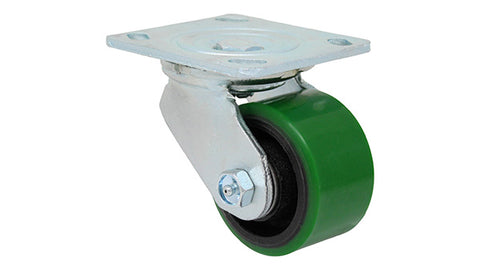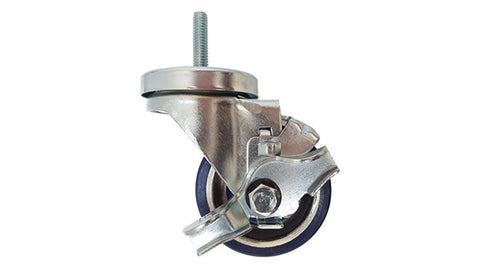Wheels have been paramount in shaping the evolution of various industries, from automotive to healthcare, right through to intricate manufacturing processes. Their importance cannot be overstated. The material of a wheel plays a critical role in dictating its performance and applicability. In this blog, we'll dive deep into the advantages and disadvantages of rubber, steel, and polyurethane wheels to help you make an informed choice.
Rubber Wheels
Advantages:
- Soft Ride: Rubber wheels ensure a soft, cushioned journey.
- Good Grip: They offer unparalleled traction across diverse surfaces.
- Quiet: Significantly quieter than their steel or polyurethane counterparts.
Disadvantages:
- Wear and Tear: These wheels can wear out faster.
- Limited Load Capacity: They may not be ideal for extremely heavy-duty applications.
Steel Wheels
Advantages:
- Durability: Steel wheels boast exceptional durability.
- High Load Capacity: Perfect for heavy machinery and demanding industrial settings.
- Cost-effective: A longer lifespan translates to less frequent replacements, making them cost-effective in the long run.
Disadvantages:
- Noise: Their operations can be rather noisy.
- Harsh Ride: They do not offer the same cushioning as rubber wheels.
Polyurethane Wheels
Advantages:
- Versatility: They function effectively on varied surfaces.
- Durability: More robust than rubber but softer than steel, striking a balance.
- Medium Load Capacity: A fit for a vast range of applications.
Disadvantages:
- Cost: Typically pricier than rubber wheels.
- Limited Grip: Their grip, especially on wet surfaces, might not measure up to rubber.
Comparisons
For a comprehensive visual comparison between rubber, steel, and polyurethane wheels, consider factors like durability, cost, load capacity, and more.
Factors to Consider Before Choosing
- Surface Type: Analyze the nature of the surface—smooth, rugged, or uneven?
- Load Capacity: Gauge the weight the wheel will need to support.
- Environment: Where will the wheel be predominantly used—indoors, outdoors, or both?
- Budget: Understand that different materials come with varied price tags.
For a more in-depth guide on selecting the right caster wheels for your requirements, read this.
Conclusion
Selecting the right type of wheel boils down to individual needs. If you're looking for comfort and silence, rubber wheels are your best bet. Steel wheels, due to their durability and high load capacity, are apt for heavy-duty purposes. And for those who want a balanced, versatile option, polyurethane wheels shine.
For the best brands in the market, consider:
Additional Resources
For further reading and insights into the world of wheels and casters, Source 4 Industries offers a plethora of articles. Whether it's understanding the significance of caster brakes or diving deep into the benefits of stainless steel casters, their resources cater to all.
By understanding the facts, advantages, and drawbacks of each wheel type, you're well-equipped to make an informed decision that best suits your needs.







